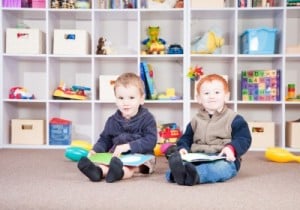
This theory is based on a recent study written by lead author Jennifer Engle and co-authored by Nancy McElwain, a University of Illinois associate professor of human development . Published in a recent issue of the journal Infant and Child Development, authors used the study to determine how the presence and quality of friendships in kindergarten impacted their behavior and social skills in the first and third grades.
Data was gathered on 567 grade school children for the Eunice Kennedy Shriver National Institute of Child Health & Human Development Study of Early Child Care and Youth Development. Mothers were asked to report whether or not their child had at least one friend in kindergarten, and if so, what the quality of that friendship was.
Teachers were also asked to provide information on the behavior and social skills of each child during kindergarten, first grade and third grade. Progress of the children was then compared by dividing the children into groups of “no friends,” “low-quality friendships,” “average-quality friendships,” and “high-quality friendships.”
“As we expected, high-quality friendships that featured cooperation and sharing, taking turns, low levels of hostility, and little destructive conflict, gave children – especially boys – practice in positive interaction, which they demonstrated in grades 1 and 3,” Engle said.
Other than the fact that children with low-quality friendships had more behavior problems in kindergarten, the impact of early friendships didn’t seem to make much of a difference. It wasn’t until grades 1 and 3 that the researchers started to notice behavior and social skill differences in the children who had high-quality friendships. What was most noticeable was the fact that girls seemed to adjust rather well, regardless of their kindergarten friendships.
“Overall, teachers reported that girls in the first and third grade had good social skills, regardless of the quality of their kindergarten friendships. Boys, on the other hand clearly benefited from the good start that high-quality friendships provided,” said Engle. “Boys who had no friends in kindergarten had more behavior problems, but not until they had reached the first and third grades.”
Engle still noted, however that high-quality friendships were important for both girls and boys. Children with close friends seemed to have better social skills and fewer behavior problems, despite their gender and kindergarteners that had not as many close friends experienced more behavior problems during kindergarten.
So what do you do if your child doesn’t have a kindergarten friend? The first step, according to McElwain, is to teach your child how to be a good friend by displaying positive expectations, caring and respect in your home and towards your child. This type of modeling teaches your child how to respond to others in a positive way and it can also help them deal with conflict, a natural part of life. “Conflict isn’t necessarily good or bad; it’s a matter of how kids approach disagreements with their friends or parents,” says McElwain.
McElwain also says that parents can set up play dates for their children or attend social events that other children will be attending. This can help encourage friendships in young children. But even if all this doesn’t work, McElwain says not to fret. According to her, “Almost all of those children [in the study] had made a friend by the time they reached third grade.”
Related Articles:
- Third Grader Weighing 200 Pounds Taken from Family, Placed in Foster Care
- Researchers Challenge Food Avoidance Recommendations for Young Children
- Study: Parental Engagement Related to Child’s Academic Success






